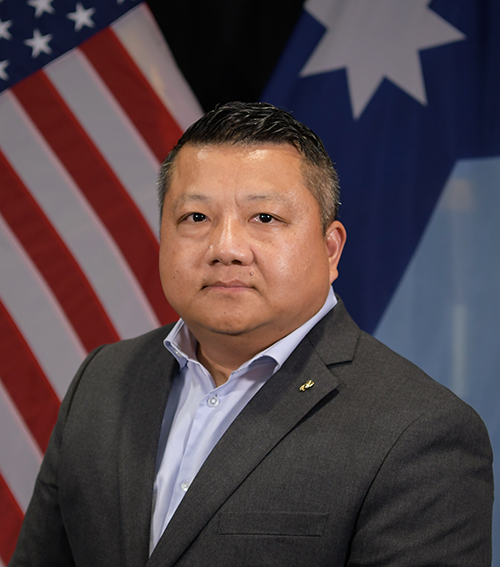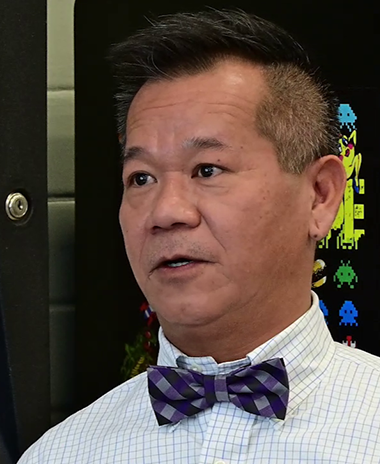5/15/2025 1:00:00 PM
The Minnesota Department of Veterans Affairs (MDVA) recognizes May as Asian American and Pacific Islander Heritage Month. We celebrate our diverse Asian community that represents a long history in our state and brings a cultural richness that includes dozens of different nationalities.
Several MDVA team members talked about the significance of Asian American and Pacific Islander Heritage Month in their lives.
 Vue Phang came to the MDVA more than a year ago as an Office Administrative Assistant in our Benefits area. His biggest responsibility is taking in benefit applications submitted by County Veterans Service Officers. Among many other things, he reviews each application for required components and inputs the data in our Veteran Application Tracking System (VATS) that manages and tracks applications for benefits. A Marine Veteran who served in Operation Iraqi Freedom II, he was in the private sector for 15 years before coming to the MDVA. Although he enjoyed it, he says there was something missing and began searching for something he could be proud of.
Vue Phang came to the MDVA more than a year ago as an Office Administrative Assistant in our Benefits area. His biggest responsibility is taking in benefit applications submitted by County Veterans Service Officers. Among many other things, he reviews each application for required components and inputs the data in our Veteran Application Tracking System (VATS) that manages and tracks applications for benefits. A Marine Veteran who served in Operation Iraqi Freedom II, he was in the private sector for 15 years before coming to the MDVA. Although he enjoyed it, he says there was something missing and began searching for something he could be proud of.
Why is it important to recognize the Asian community's role in American history and culture?
Recognizing Asian American and Pacific Islander contributions promotes a more inclusive and understanding society, encourages a more complete understanding of American history and celebrates the diverse contributions of Asian American Pacific Islander individuals.
Asian American and Pacific Islanders continue to face significant challenges, including discrimination and prejudice. Recognizing their contributions and struggles fosters understanding, which leads to a more inclusive and equitable society.
A part of American history includes the involvement of the Asian allied forces who fought alongside the United States in the Secret War during the Vietnam War. After that war, Hmong people were faced with persecution from the communist revolutionary movement that gained control of Laos in 1975. After President Jimmy Carter signed the Refugee Act of 1980, my parents fled Laos for refugee camps in Thailand before eventually settling in Minnesota.
Asian American, Native Hawaiian and Pacific Islander Heritage Month (AA and NHPI) and other celebrations provides opportunities to recognize and honor the achievements and contributions of AA and NHPI individuals. This is crucial for building a society that values diversity and recognizes the unique value everyone brings.
Describe a role model from Asian and Pacific Island culture and how they influenced you.
A good role model can come in many forms, such as mentors, family members and professional connections. My father is my role model. He has a significant and enduring influence on my life, fundamentally shaping my ethical framework, personal values and the development of my character. Growing up, I always knew that my father is a great man, because he’s always been my protector, my provider and my disciplinarian. He demonstrates unwavering selflessness by consistently placing the needs of others first, showing deep care for family, friends and neighbors, and serving as an exemplary role model for others to emulate. Through his conduct, speech and personal interactions, he has conveyed countless invaluable lessons. These lessons, though modest in appearance have profoundly influenced the entirety of my life, endowing me with lasting wisdom and foundational values. He has instilled in me the importance of self-belief and consistently encouraging a positive outlook in all circumstances. By teaching me the importnce of compassion, strength and responsibility, I learned how to be strong and stand on my own while cultivating principles of assertiveness and confidence. His tireless efforts and deep affection have played a crucial role in shaping my character and guiding me into the person I have become.
How does your work at MDVA help make a difference for Veterans and for creating a welcoming, inclusive community?
Serving Minnesota Veterans during some of the most critical and vulnerable periods of their lives is both humbling and meaningful. My role is guided by a deep respect for the sacrifices these people have made in service to our country and a sense of responsibility to support their well-being. Veteran families face challenges related to service-connected conditions, reintegration into civilian life, and financial hardships. By addressing these complex needs with our Programs & Services team, we can promote resilience and ensure financial stability. I believe that creating a supportive, respectful and inclusive environment for Veteran families not only honors their service but also lays the foundation for long-term healing and success.
I’m fortunate to be part of such a great team. Working here is fulfilling and I know without a doubt that I play a part in changing lives.
 Tan Tran is a Skills Development Specialist at the Domiciliary Program at our Hastings Veterans Home. For the past six years, he has been helping our Veterans with basic living skills such as maintaining their rooms and keeping up personal hygiene. In addition, his duties include helping Veterans be aware of their mental health needs, such as encouraging participating in telehealth video and phone visits. He also pitches in and helps other departments when he can.
Tan Tran is a Skills Development Specialist at the Domiciliary Program at our Hastings Veterans Home. For the past six years, he has been helping our Veterans with basic living skills such as maintaining their rooms and keeping up personal hygiene. In addition, his duties include helping Veterans be aware of their mental health needs, such as encouraging participating in telehealth video and phone visits. He also pitches in and helps other departments when he can.
Tan graduated high school in Minnesota and then moved to Arizona where he taught and played golf. When he returned to Minnesota, he went to school for his degree in Human Services. Tan says in 2021 he took a shot at the Hastings Veterans Home position because he wanted the opportunity to help Veterans. “When I got the phone call that I got the job, I was very excited,” Tan says. “Now I give something back to our Veterans who were willing to give their lives for our country. All I want is to give something back. So here I am and I love what I do!”
Why is it important to recognize the Asian community's role in American history and culture?
I feel that each culture and every family has a story about how America gives everyone the freedom to make a better life. Every culture brings a different role to America. Those different stories are what make our country amazing! I feel privileged to learn more about how families struggled to make the hard choices to move to different country like America. It reminds me of how my own family came here after the Vietnam War.
Describe a role model from Asian and Pacific Island culture and how they influenced you.
I don’t think I have one role model. For me, learning the stories and histories of people who came before me is what influences me. It helps me to better myself and to teach others. Like those who came before me to America, I want to support new families and help them to adjust to the freedom that is given, while at the same time learning about other cultures.
How does your work at MDVA help make a difference for Veterans and for creating a welcoming, inclusive community?
When I arrived here at Hastings Domiciliary, my first year was about learning how our Veterans think and feel – about everything! I also spent time learning from the other employees about how they talk and interact with our Veterans. I guess for me, earning trust from our Veterans is key. Once I earn that trust with our Veterans, it makes my job easier. It creates an opportunity to a find better and more effective ways to help our Residents and their families. By spreading the word to our community about the quality of care in our Homes, it creates ways to learn more about our Veterans’ needs and goals in life. It also helps people in our community step up and play a role in supporting those Veterans who need our help.
Sarikah Pannirselvam is the Finance Director at the Minnesota Veterans Homes - Minneapolis. She started in 2023 as the Assistant Finance Director and says she could tell that she wanted to stay and grow within MDVA. The Finance team is made up of accounts receivable, accounts payable, warehouse, payroll and purchasing—who all come together to ensure the smooth financial operation of the Home. Like many MDVA team members, Sarikah feels drawn to the mission. “I love when my work supports a mission I truly believe in, and I work alongside others who share a passion. MDVA offers that for me. I take a lot of pride in serving our Veterans and their families. It's quite remarkable the work from each department that goes into making this place run. It’s inspiring for me!”
Why is it important to recognize the Asian community's role in American history and culture?
I don't believe we can fully speak on American history and culture without also recognizing the Asian community. The Asian community has historically and continues to contribute so much to this country. I think we should recognize that with pride. These contributions and the coming together of so many communities are part of what makes America what it is.
Describe a role model from Asian and Pacific Island culture and how they influenced you.
Perhaps it’s a cliché, but it must be my mother. She's a Singaporean Indian woman who raised me as a single mother. She was an elementary school teacher in Cambodia and truly showed me what hard work, perseverance, commitment, love and sacrifice look like. Without her, these words would otherwise be more like concepts to me. I could not have made it to this country without her support. Sending me here required so much sacrifice from my family and specifically my mother. It's such a motivation for me to succeed here and to live life to its fullest in ways that my mother never had the opportunity for.
How does your work at MDVA help make a difference for Veterans and for creating a welcoming, inclusive community?
I'm proud of our diverse campus at Minneapolis and I'm happy to represent some of that in our leadership team. We often speak on how diverse our teams are here at the Minneapolis Veterans Home – especially when you look at all of our Homes in general. We even put up a mural as a tribute to that diversity! In addition, I think that diversity is important within our leadership team as well. That can be more rare to see in a workplace. I think part of best serving our Veterans is having a great team. To me that requires diversity. I think our staff and our Residents thrive when we feel we are part of a welcoming inclusive community. It's important we all feel seen and heard – even at a leadership level.